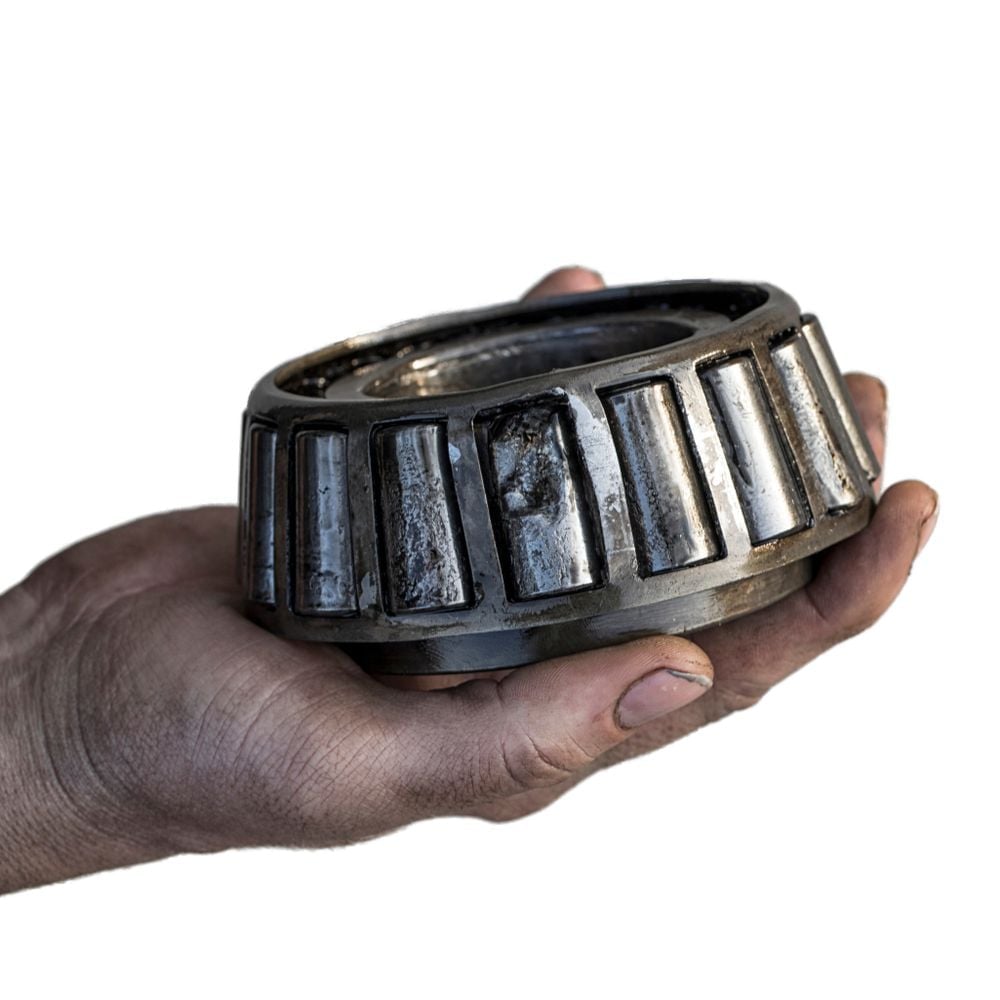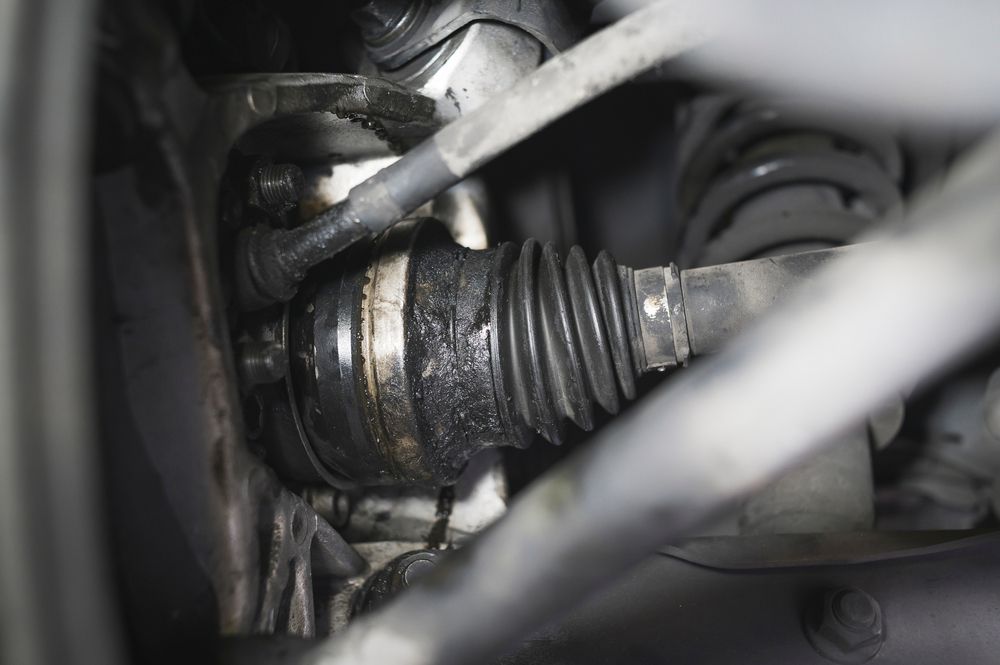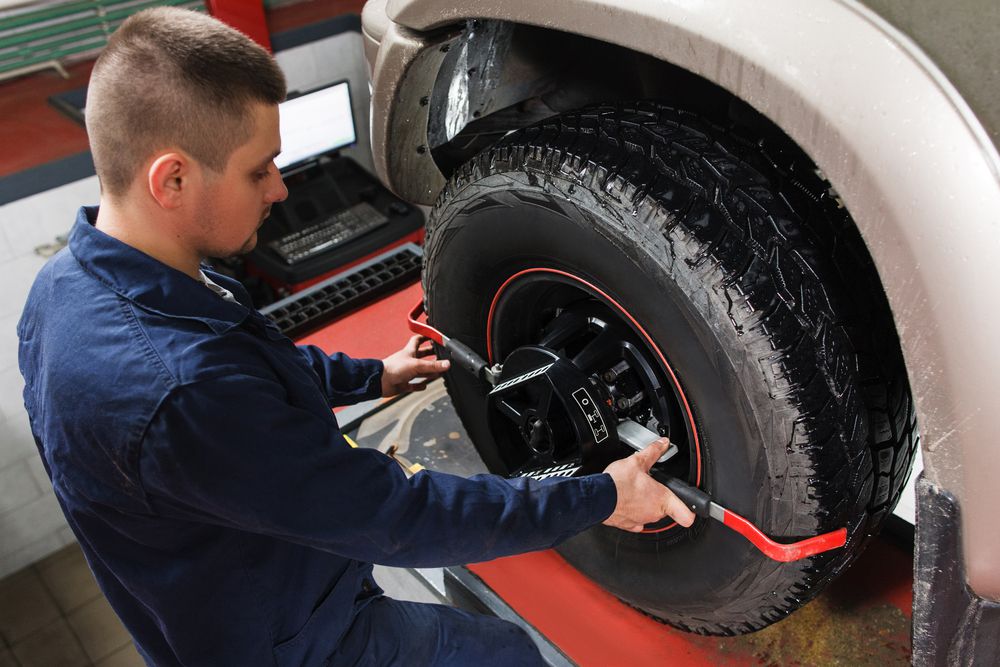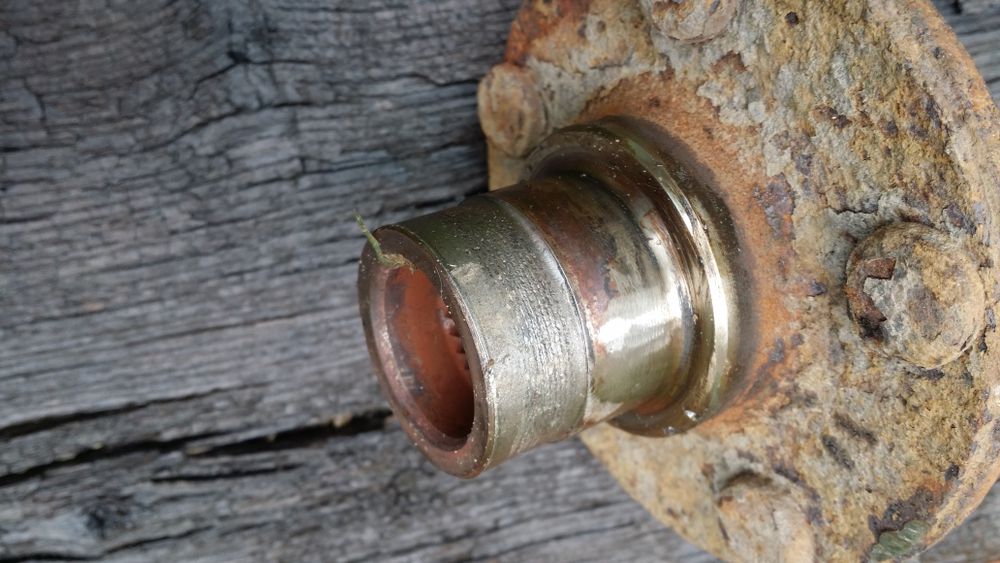
Bad wheel bearings can make your driving unsafe over time, but thankfully,
a bad wheel bearing shows symptoms that can alert you to the problem.
These bad wheel bearing symptoms include:
-
Grinding or grating noise from the wheels
-
Choppy noises when moving from left to right at moderate speeds
-
Worn patches on tires
-
Loose steering
-
Pulling to one side while braking
-
ABS failure or uneven brake pad wear
As you can see, diagnosing a bad wheel bearing can be pretty
straightforward, and if you are experiencing loose steering or have play in
your wheels, you may have a bad wheel bearing.
The rest of this article will dive into how to diagnose a bad wheel bearing
and why you need to get it replaced immediately.
 Bad wheel bearing in mechanics hand
Bad wheel bearing in mechanics hand
Can a Wheel Bearing be Bad without Play?
A wheel bearing can definitely be bad without play in your steering.
Often, one quick way to check your wheel bearings is to shake the wheel and feel for any looseness or play; however, this isn't a complete way to verify that your wheel bearings are ok, and a bearing can still be shot despite passing the 'shake a wheel' test.
What Does a Wheel Bearing Sound Like when It's Going Out?
If you've got a bad wheel bearing, you'll feel it when you drive.
Grinding, grating noises from metal on metal emanating from your tires is the most obvious symptom.
Still, you'll probably also notice that your car doesn't behave how it's supposed to, tending to lean one way or shudder and shimmy when driving on the highway.
Can a Wheel Bearing be Bad without Noise?
In general, wheel bearings will make noise when they're going bad.
For most people, it's your first warning sign that something is amiss with your wheels; however, it's certainly possible to feel a change in your car's behavior before the wheel bearing issue becomes severe enough to be heard while driving.
Usually, though, a wheel bearing does make distinct growling, rumbling, and grating noises when bad.
 Bad CV boot
Bad CV boot
How to Tell the Difference between Bad Wheel Bearing and a Bad CV Joint?
If you're hearing a growling or grinding noise when you drive, have uneven wear or patches on your tires, and your steering feels loose, you probably have a bad wheel bearing.
You might be wise to suspect a bad CV joint if you're hearing loud clicking, popping, or clunking noises when making a tight turn at low speeds.
What Will Happen if I Drive on a Bad Wheel Bearing?
Driving on a bad wheel bearing isn't wise. The most prevalent problem will be uneven wear and tear on your tires, causing your car to lean one way and become unreliable and unpredictable on the road.
Leaving a bad wheel bearing on for too long is a serious safety risk and can cause the wheel to seize up while driving or the tire to fall off entirely.
How Long Can You Drive on a Faulty Wheel Bearing?
Dealing with a faulty wheel bearing isn't something that you can put up with.
Like with your body, you need to listen to those groans, growls, and rumbles that are your car's way of telling you something's wrong.
Bad wheel bearings are something you need to get fixed immediately; thankfully, it's not a big deal to do so.
Repair costs aren't as expensive as some other major fixes, and turnaround time may be as short as a few hours if the mechanic shop has the parts on hand.
Best case scenario on bad wheel bearings: you wear out your tires unevenly and have difficulty steering.
Worst case: your wheel seizes up, or your tire falls off, creating a serious road hazard for you or others.
Does a Bad Wheel Bearing Affect Speed?
Vibration caused by a loose or bad wheel bearing can affect your speed.
The vibration prevents the car from having as much traction, making accelerating and maintaining higher speeds more unstable.
In addition, if your tires are unevenly worn due to a bad wheel bearing, your car with lean to one side, forcing you to correct course and decreasing your car's efficiency on the road.
Can a Bad Wheel Bearing Affect Acceleration?
A bad wheel bearing can affect acceleration as well as speed.
The lack, as mentioned earlier, of traction due to vibration can cause your tires not to be able to get a grip on the road and struggle to accelerate.
A bad wheel bearing makes your car unstable and not road safe and is cause for an immediate trip to your trusted mechanic.
Do Wheel Bearings Affect Brakes?
Because the rotor is attached to the wheel, a bad wheel bearing can cause more wear and tear on your brakes and inconsistency when stopping.
The wobbliness, once again, reduces traction on the road, giving your tires less grip to stop quickly.
The friction caused by a bad wheel bearing can make your wheels and brake system heat up much faster, causing it to wear down more quickly.
The inability to stop quickly and braking inconsistencies make a bad wheel bearing extremely dangerous on the road.
 Bad wheel bearings can negatively affect gas mileage
Bad wheel bearings can negatively affect gas mileage
Can Bad Wheel Bearing Affect Gas Mileage?
Bad wheel bearing affects your gas mileage in several ways.
The lack of speed and acceleration means your engine must work harder to maintain speed.
Unevenly worn wheels caused by bad wheel bearings can also have a negative effect on your mileage, too.
If you think about it, the more you have to correct your car from leaning, the more you're not traveling most efficiently (aka a straight line) on the road.
As such, not only do bad wheel bearings tax the engine more due to the increased power required to drive the wheels, but they also reduce your travel efficiency on the road.
Does Wheel Bearing Affect Power Steering?
Wheel bearing can cause instability in the power steering in several ways.
Put simply, if you're tires aren't oriented straight (which they're not with a bad wheel bearing), then your steering as a whole will be off.
Making slight course corrections will become the norm with a bad wheel bearing. In addition, you'll notice a shuddering, grinding, or grating as you adjust your direction.
This is because the wheels aren't aligned properly, putting strain on your power steering system and making even slight turns very inconsistent.
Can You Feel a Bad Wheel Bearing in a Steering Wheel?
You can feel a bad wheel bearing in your steering wheel when you make a turn at 50 miles per hour or more.
You'll notice slight shuddering and resistance in the steering wheel.
The resistance might be hard to notice if you don't have a good feel for your steering wheel or due to the effects of the power steering system.
Wobbling and vibrating are also common effects on the steering wheel when you have a bad wheel bearing.
Does Wheel Bearing Affect Alignment?
Wheel bearing affects alignment, and poor tire alignment is probably the most dangerous knock-on effect of a bad wheel bearing.
Your tire can become loose and, quite simply, isn't always pointing where you want it to go.
Even the slightest differential in one wheel can cause serious handling issues and affect driving consistency.
 Mechanic checking tire alignment
Mechanic checking tire alignment
How Do I Check for a Bad Wheel Bearing?
Once you've diagnosed that your issue is likely due to a bad wheel bearing, it's time to take some preliminary measures to check.
You can jack your car and perform the shake test where you try to manipulate the wheel.
Always take precautions using the jack to ensure you don't injure yourself.
You've found your issue if there's play in the wheel.
If not, it's still possible you have a bad wheel bearing or CV joint. Another way to diagnose a bad wheel bearing is if you spin the wheel and hear a rattling sound.
In the end, if you're unsure about the results of the shake test and are still experiencing handling issues on the road, it's best to take your car down to the shop for inspection.
Tell the mechanic what's going on with your car.
Turnaround times and prices for wheel bearing replacement are pretty cheap (especially if you're doing the labor), so it's worth the out-of-pocket expense for peace of mind on the road.
Should You Replace Both Wheel Bearings at the Same Time?
Ideally, you should replace both wheel bearings at the same time.
If you think about it rationally, if one wheel bearing has begun to break down after a certain time, then the opposite side wheel bearing will likely follow suit soon enough.
You don't want to rush your car back into the mechanics to pay for more labor when you could just have a fresh pair of wheel bearings in one visit.
Is It Ok To Replace Just One Wheel Bearing?
It's ok to replace one wheel bearing, but it's not ideal. A bad wheel bearing may be due to a flaw in manufacturing, but it may also be wear and tear on the road.
If it's the latter, your opposite wheel bearing will likely start going bad soon anyway.
It's cheaper to get both done at once, and it's worth the peace of mind to know you have a new pair of bearings for the road.
 Damaged wheel hub caused old and worn wheel bearing
Damaged wheel hub caused old and worn wheel bearing
Can You Replace a Wheel Bearing without Replacing the Hub?
The answer depends on the individual car. Some bearings are mounted onto the hub, so removing them is tough without damaging the other bearings or the hub itself.
Others are a lot easier.
If you're replacing the hub, you'll need new bearings given the way they are mounted on the hub, but if you're just trying to replace the bearings, then you might be able to replace them independently of the hub, depending on your car.
What are the signs of a bad wheel hub? Bad wheel hubs can make your wheels loose and have too much play, causing difficulty steering or handling on the road.
How Much Does It Cost to Replace a Wheel Bearing?
Thankfully, replacing a wheel bearing or set of wheel bearings is pretty quick and doesn't cost too much.
Wheel bearings are cheap, anywhere from $15-$60. Most of what you're paying for at a car shop is labor hours, so if you go for the DIY route, you can save a good amount on the replacement price.
Just exercise caution when working around your car on a jack.
Ideally, you'll want to replace both wheel bearings, one for the affected wheel and the other for the opposite side, when you're doing the project.
The main difficulty is taking off the wheel and removing the bearing hub assembly without damaging the other bearings, again dependent on the kind of hub assembly you have in your car.
Costs may vary from $150 to $800 at a shop, depending on whether they feel it's necessary to replace the hub assembly.
Conclusion
A bad wheel bearing is extremely unsafe on the road, but thankfully, they're easy to spot if you know what you're looking for.
Funny noises from the wheel, including grating, whining, growling, or shuddering when turning, are all bad wheel bearing symptoms.
Always take the health of your car seriously and get it serviced or investigate yourself to determine if you have a bad wheel bearing.